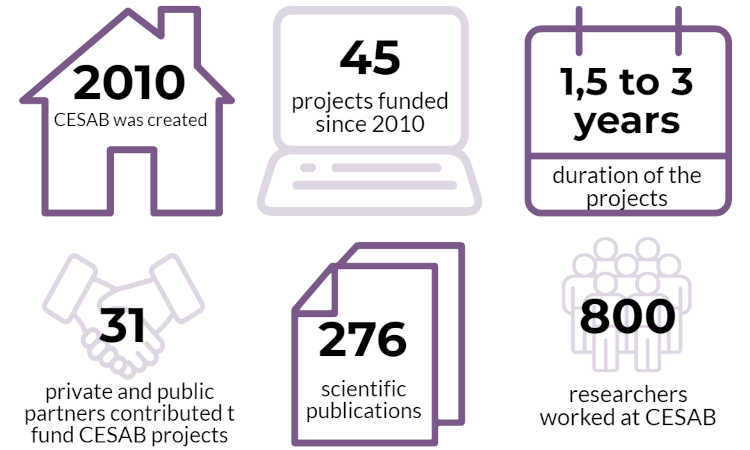[FRB-CESAB] Newsletter 7 CESAB- Septembre 2022
The FRB’s Center for Biodiversity Synthesis and Analysis (CESAB) is a research structure with an international scope whose objective is to implement innovative work on the synthesis and analysis of existing data sets in the field of biodiversity. Twice a year, the CESAB publishes a newsletter listing the different news and activities going on.
![[FRB-CESAB] Newsletter 7 CESAB- Septembre 2022](https://www.fondationbiodiversite.fr/wp-content/uploads/2022/09/Verena_Francois_CES_CESAB.jpg)
A word from Verena TRENKEL and François MASSOL, co-presidents of CESAB scientific committee
The 22 members of the new CESAB Scientific Committee (CS) have recently started their work for a four-year term. We are honored to lead this multidisciplinary (and parity!) committee as co-presidents. This is the first time that the CESAB CS is led by a co-chair and we intend to demonstrate that two co-chairs are more than the sum of two. We would like to start this mandate by thanking the CS members for their trust and the FRB for the freedom and the human and financial means made available to the CS to carry out efficiently the evaluation and monitoring of projects.
Our co-presidency comes at a time when the support of the FRB, the founding members and the collaboration with other funders allow CESAB to expand its role as a catalyst for science and international collaborations. 22 projects are underway at CESAB and many more are to come. The dynamics of the projects at CESAB and its partnerships with other institutions around the world, largely driven by its director Nicolas Mouquet, is a sign of good health and we are proud to be able to contribute to it in the four years to come. The international training courses offered by CESAB, notably on reproducibility, the use of theories and meta-analyses in ecology and environmental sciences, are also the mark of a stronger involvement of CESAB in the scientific ecology landscape. Finally, other CESAB activities, such as hosting researchers on sabbatical or conference days around a project, also contribute to CESAB’s influence in the context of research on biodiversity and the environment, both in France and internationally.
The CS is currently following the 2022 CESAB call for proposals which will allow, at the end of the evaluation procedure, three new projects to gather and compare their data and ideas. Other calls for projects are already open, including an FRB-MTE-OFB call “Impacts on Biodiversity in the Anthropocene” and an FRB-TULIP-PNDB-BiodivOc call “Datashare”. As in previous years, CESAB will fund about 15 projects that will contribute to building scientific consensus on a large number of crucial issues in view of the current climate and ecological crisis. To meet the challenges posed by the Agenda 2030 and its 17 sustainable development goals, the contributions of CESAB projects will be needed.
Without wishing to give away too much about the program of the future CS meetings, and beyond the management of calls for projects, we can already announce that the CS will be thinking about new ideas to contribute to the advancement of science, based on the synthesis of data, models, concepts… One of our wishes is also to create more opportunities to disseminate the results of Cesab projects to the public. Let’s hope that the next four years of the CS will allow us to work in this direction.
We wish you all a good start to the new school year and look forward to seeing you soon at Cesab.
Verena Trenkel and François Massol
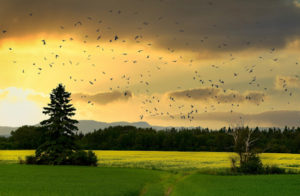
Launched in June, this joint call between the FRB’s CESAB, the Laboratory of Excellence (LabEX) TULIP, the National Center for Biodiversity Data (PNDB) and the challenge BiodivOc, aims to accelerate the sharing of large-scale, open-access biodiversity datasets. It complements traditional biodiversity synthesis calls, which aim at fostering the analysis of existing data and the synthesis of ideas and concepts, with a specific focus on data compilation and sharing. For its first edition in 2022, the joint call will fund two 2-year projects.
Proposal deadline on September 22 at 13:00 CEST and final selection in December.
More information on the DATASHARE call

Launched in June 2022 for the second consecutive year in partnership with the Ministry of Ecological Transition (MTE) and the French Biodiversity Office (OFB), this call aims to characterize the positive, negative or non-existent impacts of human activities and induced pressures on the state and dynamics of terrestrial biodiversity.
Projects should focus on at least one of these three themes:
- highlight links between human pressures and the state of biodiversity;
- characterize the links between pressures and impacts using new data processing technologies, new indicators, new protocols, etc.;
- response to gaps in current monitoring of human pressures or their impacts (spatial distribution, temporal frequency, types of pressure, type of biodiversity).
This call for proposals will allow the funding of:
- 3 data SYNTHESIS projects of three years– synthesis of ideas and/or concepts, analyses of existing data
- 4 to 6 one-year SYNERGY projects– complementary answers to a question that emerges from a research project that has been finalized or is underway
- 1 to 2 SYSTEMATIC REVIEW projects of two years– inventory of human practices that have an impact on biodiversity and a summary of the state of knowledge on the impacts considered
Pre-proposal deadline on September 22 at 13:00 CEST. Final selection in December for the SYNERGY and SYSTEMATIC REVIEW projects and in March 2023 or the SYNTHESIS projects.
More information on the FRB-MTE-OFB call

Through its CESAB, the FRB opened in Spring its 2022 call for research proposals to fund three innovative projects relating to the synthesis of ideas and concepts and/or the analysis of existing data. The main aim of these projects should be to improve scientific knowledge of biodiversity and demonstrate how we can use this knowledge to better protect it. Six pre-proposals were selected in the first phase. Three projects will be selected in the final phase and funded for a period of three years, including: the recruitment of a post-doctoral fellow for 24 months, the organization of six meetings of the working group at CESAB and the promotion and publication of the results.
More information on the 2022 CESAB call
Watch on on your YouTube channel the conference Retrouvez sur notre chaîne YouTube la conférence “From species to functions: towards a paradigm shift for biodiversity conservation?“, organised on the 16th of June 2022 in Montpellier on the work of the FRB-CESAB project FREE, in partnership with EDF, CEFE, LabEX CEMEB and MUSE.
This conference will present a new facet of biological rarity – functional rarity – and will lay the foundations for biodiversity and rarity conservation policies, revisited in the light of functional ecology. The working group FREE has largely contributed to the development of the conceptual basis of functional rarity and has proposed global analyses attempting to identify areas of the globe with a significant proportion of ecologically unique species.
- Introduction Hélène SOUBELET (FRB director), Nicolas MOUQUET (CESAB scientific director)
- Conservation of biodiversity through a functional lens Cyrille VIOLLE (Cefe CNRS, Montpellier)
- Practical applications of functional diversity and rarity to the definition of spatial conservation priorities – promises and limits Ana RODRIGUES (Cefe CNRS, Montpellier)
- The commonness of rarity: (big) data, theory, and implications for conservation Brian ENQUIST (University of Arizona, USA)
- The functional consequences of marine megafaunal extinctions Catalina PIMENTO (University of Zurich)
- The biogeography of functional rarity David MOUILLOT (Marbec, University of Montpellier)
A workshop dedicated to the use of different R packages to calculate several functional rarity/diversity indices was organised before the conference. 15 young researchers participated.
- Four synthesis projects within the call FRB-MTE-OFB “Impacts on terrestrial biodiversity in the Anthropocene”

These SYNTHESIS 3-years projects will develop syntheses of ideas and/or concepts, analyses of existing data, and will focus on factors affecting the state, evolution and dynamics of biodiversity. They will start beginning of 2023. Three SYNERGY projects and one SYSTEMATIC MAP project have also been selected within this call.
Towards a silent spring? Modeling and projecting the impacts of the Anthropocene on soundscapes with birds as an acoustic ecological indicator
Principal investigators: Jean-Yves BARNAGAUD (EPHE, France) and Solène CROCI (CNRS, France)
French biodiversity in the Anthropocene – impacts and drivers of spatial and temporal response
Principal investigators: Wilfried THUILLER (CNRS, France) and Franziska SCHRODT (University of Nottingham, United Kingdom)
Impact of Land use and management on earthworm communities
Principal investigators: Daniel CLUZEAU (University of Rennes, France) and Céline PELOSI (INRAE, France)
What role for the spatial organisation of human societies to modulate their pressures on biodiversity?
Principal investigators: Isabelle BOULANGEAT (INRAE, France) and Mohamed HILAL (INRAE, France)
- Two projects within the call SYNERGY FRB-CESAB / SinBiose / FAPESP / CEBA “Biodiversity in the neotropical realm”
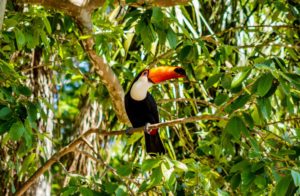
The call for proposals was launched in 2021 in partnership with SinBiose, FAPESP, and LabEX CEBA, and resulted in the selection of two projects on neotropical biodiversity out of nine proposals received. The two working groups, made up of 10 international researchers, will be funded for three years, and will meet four times in France at Cesab and in Brazil in the state of Sao Paulo. Both projects will start in early 2023 in Brazil.
The relationship between soil macrofauna biodiversity and ecosystem services delivery across land use systems in neotropical rainforest biomes
Principal investigators: Jérôme MATHIEU (Sorbonne Université, France) and Miguel COOPER (University of Sao Paulo, Brésil)
Networks of Fungal Interactions in the Neotropics
Principal investigators: Mélanie ROY (Université de Toulouse, France) and Paulo GUIMARAES (University of Sao Paulo, Brésil)
The CESAB Scientific Committee (CS) drafts and monitors call for proposals, and selects the scientific projects submitted. More broadly, its mission is to carry out a general reflection on the strategic orientations of Cesab.
It was partly renewed at the beginning of 2022: for this new 4-year term, the CS has 22 members, including 12 new ones and is co-chaired by Verena TRENKEL (IFREMER) and François MASSOL (CNRS). We warmly thank the leaving members for their work and for having kindly extended their mandate until the new CS was active: Isabelle ARPIN, Jean-François BAROILLER, Sébastien BAROT, Clément CALENGE, Bruno FADY, Philippe GROS, Sonia KEFI, Hélène MORLON, Laurianne MOUYSSET, Olivier THEBAUD.
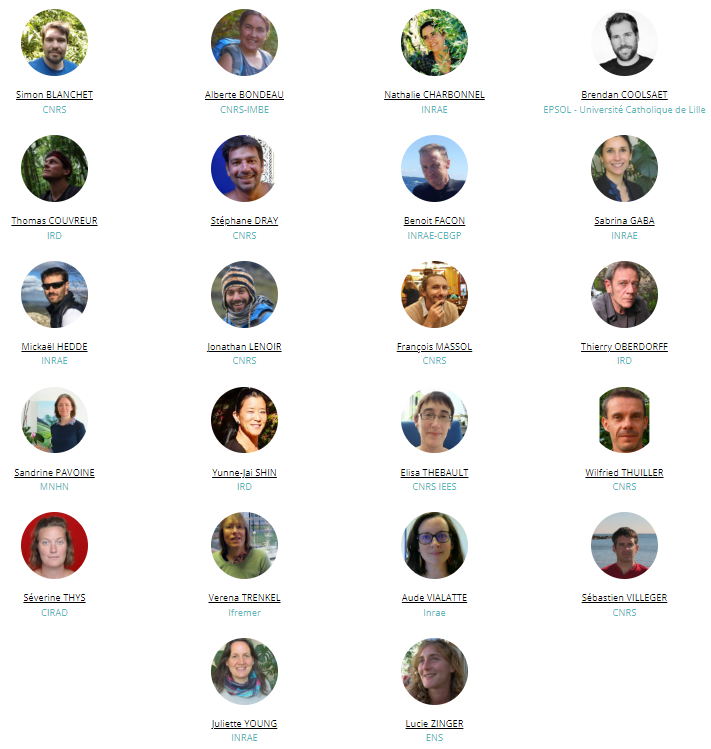
More information on the CESAB Scientific Committee
The FRB-CESAB is increasingly committed to training young researchers in the tools to analyse biodiversity and proposes three training courses in 2022, including two new ones.
- Theory-driven Analysis of Ecological Data / 16-20 May 2022

This new 5-day training course, organized with the GdR TheoMoDive aimed to train young researchers in analyzing ecological data using theory-driven approaches. 15 participants were selected and the training course took place from the 16th to the 20th of May 2022 in the CESAB premises in Montpellier. It will be renewed in 2023. Subscribe to CESAB newsletter to keep informed when registration will open.
- Biodiversity knowledge synthesis: an introduction to meta-analyses and systematic reviews / 3-7 October 2022

- Data Toolbox for Reproducible Research in Computational Ecology / 28 November-2 December 2022

More information on CESAB training courses
- Sixteen groups at CESAB this first semester
Out of the ongoing 24 projects, sixteen groups met between February and July 2022 in Montpellier, including three for CESABAFTER meetings: complementary meetings during which GEISHA, FREE and FUNCTIONALWEBS were able to extend their research work, finalize articles in the process of being written, and initiate a new dynamic of scientific collaboration as an extension of their initial project. Several groups also met remotely.
The autumn will also be busy with 12 weeks of meetings already scheduled between mid-September and mid-December.
- Two “Cesabatics” hosted at CESAB in Spring

After several postponements due to restrictive sanitary conditions of the last two years, the CESAB finally hosted two researchers on sabbatical in the first semester of 2022: Tom LETESSIER from the Zoological Society of London and Kasey BARTON, from the University of Hawaii (USA). Both researchers were funded through the 2020 call for projects, in partnership with the LabEX Mediterranean Center for Environment and Biodiversity (CeMEB).
- CESAB postdocs team
CESAB is currently hosting five postfocs:
- Brunno OLIVEIRA is working with BIOSHIFTS looking at whether species range shift processes vary across ecosystems, taxonomic groups, or environmental contexts (both natural and anthropogenic) to understand species vulnerability to global changes
- Aurore RECEVEUR is working with MAESTRO looking at integrated models and scenarios to better predict and anticipate the mixed impacts of climate change and fishing pressure on marine communities, using data from exploited communities in the Northeast Atlantic and Mediterranean Sea.
- Aaron SEXTON is working with NAVIDIV and is looking at mitigating the impacts of navigation and inland navigation infrastructures on biodiversity by evaluating the general effects of navigation intensity depending on land-cover types and territorial characteristics, and investigate underlying mechanisms to identify management compromises.
- Erica RIEVRS BORGES is working with BRIDGE and is looking at the role of local and regional environmental factors in shaping the taxonomic and functional diversity of plant communities established along river corridors, roadside corridors and cultivated field margins.
- Devi VEYTIA is conducting a systematic review of scientific literature, within the Priority Research Program (PRP) Ocean & Climate, on ocean-based solutions to mitigate and adapt to climate change.
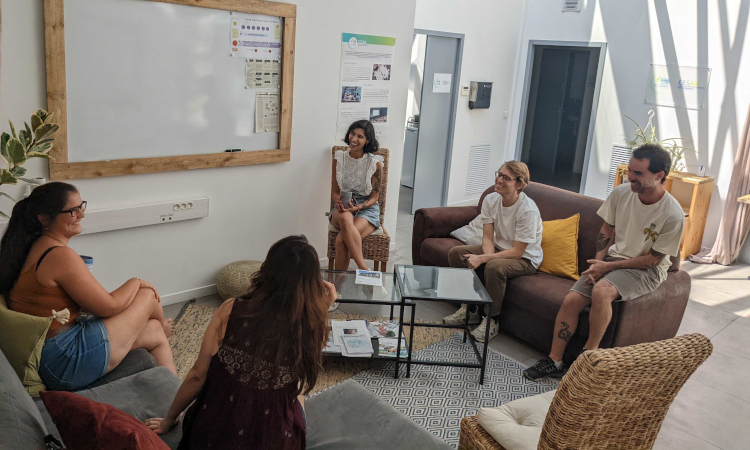
From left to right : Aurore RECEVEUR, Erica RIEVRS BORGES, Devi VEYTIA, Aaron SEXTON, Brunno OLIVEIRA
All the best to Andrew HELMSTETTER and Ali BEN ABBES, whose contracts ended this summer (respectively on the DIVERS and PARSEC projects) after 24 months at Cesab.
Six new postdocs should join the team in 2023. Depending on the CESAB’s capacity, they will join the center or be hosted in the laboratories of the principal investigators.
- Zoom on INDYSEM
Funded by the 2020 Systematic Reviews call, the INDYSEM project aims to identify and analyze the interactions between marine biodiversity and human societies in order to identify how ecological dynamics, whether natural or related to anthropogenic forcing, have an effect on the production and demand for marine ecosystem services. In 2021, the research team published a paper on the systematic map method to highlight the clustering and knowledge gaps on how changes in marine ecosystems influence the provision of marine ecosystem services (Campagne et al., 2021).
Sylvie CAMPAGNE (postdoc) and Eric THIEBAUT (project leader) supervised in spring 2022 a student in Master 2 “Marine Sciences” at Sorbonne University, Laurie-Anne ROY: preliminary results were presented at a workshop on ecosystem services organized in Wimereux (Thiébaut E., Roy L.-A., Campagne S.C. How does the evolution of marine ecosystems influence the provision of ecosystem services? First results of a systematic mapping).
- Zoom on AFROBIODRIVERS
Results from the AFROBIODRIVERS project were presented to the Members Parties of the Congo Basin Forest Partnership (CBFP) early July in Libreville, Gabonese Republic. Linked to the Convention on Biological Diversity (CBD), which aims to protect 30% of the globe by 2030″, the member states of the Central African Forest Commission are invited to increase funding, improve management, identify other effective conservation measures by areas (AMCEZ), and focus scarce resources on smaller areas to improve the effectiveness of protected area management (Scholte et al., 2021).
You can also read the French synthesis of the artcile: “La conservation sur des espaces surdimensionnés et le déclin de la faune sauvage et du tourisme dans les savanes d’Afrique centrale“.
-
- Publications from CESAB working groups
Li X, Hamilton CA, St Laurent R, Ballesteros-Mejia L, Markee A, Haxaire J, Rougerie R, Kitching IJ & Kawahara AY (2022) A diversification relay race from Caribbean-Mesoamerica to the Andes: Historical biogeography of Xylophanes hawkmoths. Proceedings of the Royal Society B: Biological Sciences, 289, 20212435. doi: 10.1098/rspb.2021.2435.
Käfer J, Méndez M & Mousset S (2022) Labile sex expression in angiosperm species with sex chromosomes. Philosophical Transactions of the Royal Society B: Biological Sciences, 377, 20210216. doi: 10.1098/rstb.2021.0216.
de Garidel-Thoron T, Chaabane S, Giraud X, Meilland J, Jonkers L, Kucera M, Brummer G-JA, Grigoratou M, Monteiro FM, Greco M, Mortyn PG, Kuroyanagi A, Howa H, Beaugrand G & Schiebel R (2022) The foraminiferal response to climate stressors project: Tracking the community response of planktonic foraminifera to historical climate change. Frontiers in Marine Science, 9, 827962. doi: 10.3389/fmars.2022.827962.
Auber A, Waldock C, Maire A, Goberville E, Albouy C, Algar AC, McLean M, Brind’Amour A, Green AL, Tupper M, Vigliola L, Kaschner K, Kesner-Reyes K, Beger M, Tjiputra J, Toussaint A, Violle C, Mouquet N, Thuiller W & Mouillot D (2022) A functional vulnerability framework for biodiversity conservation. Nature Communications, 13, 4774. doi: 10.1038/s41467-022-32331-y.
Brun P, Violle C, Mouillot D, Mouquet N, Enquist BJ, Munoz F, Münkemüller T, Ostling A, Zimmermann NE & Thuiller W (2022) Plant community impact on productivity: Trait diversity or key (stone) species effects? Ecology Letters, accepted. doi: 10.1111/ele.13968.
Delalandre L, Gaüzère P, Thuiller W, Cadotte MW, Mouquet N, Mouillot D, Munoz F, Denelle P, Loiseau N, Morin X & Violle C (2022) Functionally distinct tree species support long-term productivity in extreme environments. Proceedings of the Royal Society B: Biological Sciences, 289, 20211694. doi: 10.1098/rspb.2021.1694.
Feng X, Enquist BJ, Park DS, Boyle B, Breshears DD, Gallagher RV, Lien A, Newman EA, Burger JR, Maitner BS, Merow C, Li Y, Huynh KM, Ernst K, Baldwin E, Foden W, Hannah L, Jorgensen PM, Kraft NJB, Lovett JC, Marquet PA, McGill BJ, Morueta‐Holme N, Neves DM, Núñez‐Regueiro MM, Oliveira‐Filho AT, Peet RK, Pillet M, Roehrdanz PR, Sandel B, Serra‐Diaz JM, Símová I, Svenning J, Violle C, Weitemier TD, Wiser S & López‐Hoffman L (2022) A review of the heterogeneous landscape of biodiversity databases: Opportunities and challenges for a synthesized biodiversity knowledge base. Global Ecology and Biogeography, accepted. doi: 10.1111/GEB.13497.
Guo W-Y, Serra-Diaz JM, Schrodt F, Eiserhardt WL, Maitner BS, Merow C, Violle C, Anand M, Belluau M, Bruun HH, Byun C, Catford JA, Cerabolini BEL, Chacón-Madrigal E, Ciccarelli D, Cornelissen JHC, Dang-Le AT, de Frutos A, Dias AS, Giroldo AB, Guo K, Gutiérrez AG, Hattingh W, He T, Hietz P, Hough-Snee N, Jansen S, Kattge J, Klein T, Komac B, Kraft NJB, Kramer K, Lavorel S, Lusk CH, Martin AR, Mencuccini M, Michaletz ST, Minden V, Mori AS, Niinemets Ü, Onoda Y, Peñuelas J, Pillar VD, Pisek J, Robroek BJM, Schamp B, Slot M, Sosinski ÊE, Soudzilovskaia NA, Thiffault N, van Bodegom P, van der Plas F, Wright IJ, Xu W-B, Zheng J, Enquist BJ & Svenning J-C (2022) High exposure of global tree diversity to human pressure. Proceedings of the National Academy of Sciences of the United States of America, 119, e2026733119. doi: 10.1073/pnas.2026733119.
Magneville C, Loiseau N, Albouy C, Casajus N, Claverie T, Escalas A, Leprieur F, Maire E, Mouillot D & Villéger S (2022) mFD: an R package to compute and illustrate the multiple facets of functional diversity. Ecography, 44, 1–15. doi: 10.1111/ecog.05904.
Sabatini FM, Jiménez-Alfaro B, Jandt U, Chytry M, Field R, Kessler M, Lenoir J, Schrodt F, Wiser SK, Arfin Khan MAS, Attorre F, Cayuela L, De Sanctis M, Dengler J, Haider S, Hatim MZ, Indreica A, Jansen F, Pauchard A, Peet RK, Petrik P, Pillar VD, Sandel B, Schmidt M, Tang Z, van Bodegom P, Vassilev K, Violle C, Alvarez-Davila E, Davidar P, Dolezal J, Hérault B, Galán-de-Mera A, Jiménez J, Kambach S, Kepfer-Rojas S, Kreft H, Lezama F, Linares-Palomino R, Monteagudo Mendoza A, N’Dja JK, Phillips OL, Rivas-Torres G, Sklenár P, Speziale K, Strohbach BJ, Vásquez Martínez R, Wang H-F, Wesche K & Bruelheide H (2022) Global patterns of vascular plant alpha diversity. Nature Communications, 13, 4683. doi: 10.1038/s41467-022-32063-z.
Céréghino R, Trzcinski MK, MacDonald AAM, Marino NAC, Acosta Mercado D, Leroy C, Corbara B, Romero GQ, Farjalla VF, Barberis IM, Dézerald O, Hammill E, Atwood TB, Piccoli GCO, Ospina Bautista F, Carrias J-F, Leal JS, Montero G, Antiqueira PAP, Freire R, Realpe E, Amundrud SL, de Omena PM, Campos ABA & Srivastava DS (2022) Functional redundancy dampens precipitation change impacts on species-rich invertebrate communities across the Neotropics. Functional Ecology, accepted. doi: 10.1111/1365-2435.14048.
Ruiz T, Carrias J-F, Bonhomme C, Farjalla VF, Jassey VEJ, Leflaive J, Compin A, Leroy C, Corbara B, Srivastava DS & Céréghino R (2022) Asynchronous recovery of predators and prey conditions resilience to drought in a neotropical ecosystem. Scientific Reports, 12, 8392. doi: 10.1038/s41598-022-12537-2.
Chang C-W, Miki T, Ye H, Souissi S, Adrian R, Anneville O, Agasild H, Ban S, Beeri-Shlevin Y, Chiang Y-R, Feuchtmayr H, Gal G, Ichise S, Kagami M, Kumagai M, Liu X, Matsuzaki S-IS, Manca MM, Noges P, Piscia R, Rogora M, Shiah F-K, Thackeray SJ, Widdicombe CE, Wu J-T, Zohary T & Hsieh C-H (2022) Causal networks of phytoplankton diversity and biomass are modulated by environmental context. Nature Communications, 13, 1140. doi: 10.1038/s41467-022-28761-3.
Pickering J, Coolsaet B, Dawson NM, Suiseeya K, Inoue C & Lim M (2022) Rethinking and upholding justice and equity in transformative biodiversity governance. In: Visseren-Hamakers I & Kok M (Eds.), Transforming Biodiversity Governance, Cambridge: Cambridge University Press (pp. 155–178). doi: 10.1017/9781108856348.009.
Auber A, Waldock C, Maire A, Goberville E, Albouy C, Algar AC, McLean M, Brind’Amour A, Green AL, Tupper M, Vigliola L, Kaschner K, Kesner-Reyes K, Beger M, Tjiputra J, Toussaint A, Violle C, Mouquet N, Thuiller W & Mouillot D (2022) A functional vulnerability framework for biodiversity conservation. Nature Communications, 13, 4774. doi: 10.1038/s41467-022-32331-y.
Machicao J, Ben Abbes A, Meneguzzi L, Corrêa PLP, Specht A, David R, Subsol G, Vellenich D, Devillers R, Stall S, Mouquet N, Chaumont M, Berti-Equille L & Mouillot D (2022) Mitigation strategies to improve reproducibility of poverty estimations from remote sensing images using deep learning. Earth and Space Science, 9, e2022EA002379. doi: 10.1029/2022EA002379.
Machicao J, Specht A, Vellenich D, Meneguzzi L, David R, Stall S, Ferraz K, Mabile L, O’Brien M & Corrêa P (2022) A deep-learning method for the prediction of socio-economic indicators from street-view imagery using a case study from Brazil. Data Science Journal, 21, 1–15. doi: 10.5334/dsj-2022-006.
Schiettekatte NMD, Brandl SJ, Casey JM, Graham NAJ, Barneche DR, Burkepile DE, Allgeier JE, Arias-Gonzaléz JE, Edgar GJ, Ferreira CEL, Floeter SR, Friedlander AM, Green AL, Kulbicki M, Letourneur Y, Luiz OJ, Mercière A, Morat F, Munsterman KS, Rezende EL, Rodríguez-Zaragoza FA, Stuart-Smith RD, Vigliola L, Villéger S & Parravicini V (2022) Biological trade-offs underpin coral reef ecosystem functioning. Nature Ecology & Evolution, accepted. doi: 10.1038/s41559-022-01710-5.
Strona G, Beck PS, Cabeza M, Fattorini S, Guilhaumon F, Micheli F, Montano S, Ovaskainen O, Planes S, Veech JA & Parravicini V (2021) Ecological dependencies make remote reef fish communities most vulnerable to coral loss. Nature Communications, 12, 7282. doi: 10.1038/s41467-021-27440-z.
Strona G, Lafferty KD, Fattorini S, Beck PS, Guilhaumon F, Arrigoni R, Montano S, Seveso D, Galli P, Planes S & Parravicini V (2021) Global tropical reef fish richness could decline by around half if corals are lost. Proceedings of the Royal Society B: Biological Sciences, 288, 20210274. doi: 10.1098/rspb.2021.0274.
-
- Publications from the FRB-CESAB team
Langlois J, Guilhaumon F, Baletaud F, Casajus N, de Almeida Braga C, Fleuré V, Kulbicki M, Loiseau N, Mouillot D, Renoult JP, Stahl A, Stuart-Smith RD, Tribot A-S & Mouquet N (2022) The aesthetic value of reef fishes is globally mismatched to their conservation priorities. PLoS Biology, 20, 1–22. doi: 10.1371/journal.pbio.3001640.
Mouton TL, Leprieur F, Floury M, Stephenson F, Verburg P & Tonkin JD (2022) Climate and land‐use driven reorganisation of structure and function in river macroinvertebrate communities. Ecography, accepted. doi: 10.1111/ecog.06148.
Mouton TL, Stephenson F, Torres LG, Rayment W, Brough T, McLean M, Tonkin JD, Albouy C & Leprieur F (2022) Spatial mismatch in diversity facets reveals contrasting protection for New Zealand’s cetacean biodiversity. Biological Conservation, 267, 109484. doi: 10.1016/j.biocon.2022.109484.

The French Foundation for Research on Biodiversity (FRB) is a platform between the various scientific actors and the actors of the society on biodiversity. It contributes to the dissemination of research results while co-constructing calls for research projects with researchers and society (private and public). It strives to mobilize research to integrate societal issues and to support stakeholders in the use of scientific expertise to implement effective policies.
An example of successful collaboration between research and society is the CESAB project FREE, which looks at functional scarcity and is co-funded by the Electricité de France (EDF) group. Jeremy BUTTIN, head of the EDF Research & Development team with expertise in ecology, explains why EDF funds research projects in this area: “For us, the environment is something that can interfere with the way we produce energy, such as in the case of extreme weather events or low water supply, but it is also something towards which we have a responsibility to limit and mitigate our impacts. In order to reduce them, we strive to identify, objectify and quantify them using more global and integrative approaches, such as those developed in the project FREE in connection with the notion of functional diversity. We work with many research organizations such as INRAE, MNHN and CNRS, in order to benefit from the highest level of expertise on a wide range of research in the field of ecology and to increase our credibility with stakeholders through the direct involvement of external and independent partners in the production of objective scientific data and results”.
Led by Cyrille VIOLLE, a CNRS researcher (at CEFE, Center in Ecology en Evolutionary Ecology), FREE examines the causes and consequences of functional rarity from the local to the global scale. The project began in 2018 and brings together more than 15 experts in community ecology, macroecology, biogeography, macroevolution, functional ecology and conservation ecology. “This group is a really special partnership between academia and a private company,” explains Cyrille VIOLLE. When I started talking with EDF, we very quickly found common research questions, which greatly facilitated future interactions. This partnership is also special because an EDF R&D researcher, Anthony MAIRE, is an integral part of our group.” Indeed, EDF not only funds research but also conducts research projects within its R&D. “Joining and working with such a talented team of researchers was really easy and offered many opportunities,” explains Anthony MAIRE. This working group has been essential for us in bringing new approaches and methods to our usual way of working on more operational topics. It has also strengthened our research network remarkably and opened the door to other collaborative projects that were not possible before FREE.
FREE is a successful example of collaboration between academic research and the private sector. It is a productive project that has resulted in numerous scientific publications, built a large network of collaborators, found new funding and generated numerous satellite projects. EDF hopes to continue this partnership to enable FREE to go further, particularly by proposing a new predictive framework for conservation biology.
